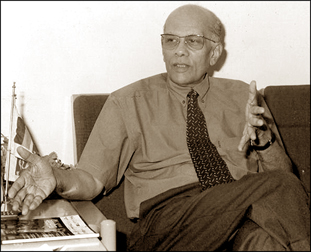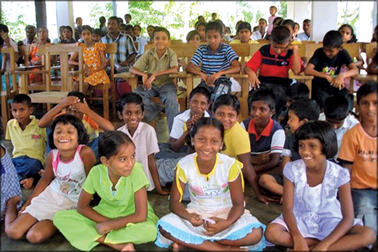Young entrepreneurs - learning to stand on their own
by Shanika SRIYANANDA
 |
|
Patrick Amerasinghe --
the livewire behind success of YESL |
"I am from Mahiyanganaya, a district which people think is really
backward and under-developed. But today I proved that children of
Mahiyanganaya are equally talented and they are on par with the children
in Colombo. I must thank the Young Entrepreneurs of Sri Lanka (YESL) for
helping us to change the myth", the vibrant voice of M.A.K. Mahesha
Kalyani of the Mahiyangana National School reverberated in the packed
hall.
Replaying the video of the ceremony held to award the 'Product of the
Year' at the Young Entrepreneur of the Year in 2007, a top business icon
broke down with tears with happiness while he was explaining the mission
of the YESL.
"I was able to tap the talents of these rural children and guide them
to chose the correct avenue", he murmurs with tears gushing down.
Mahesha who was the Chairman of the Company - Splendour - which
produced 'rasa posa' with kurakkan and rice flour - using the resources
from their villages - won the gold medal in 2007. Today, she, who
learned the ABC of business and economics from her tender days is
thankful to YESL that she has gained entrance to the University of Sri
Jayawardenapura for her degree in Management.
Ananda Piyankara, a student of Richmond College, who won the 'Most
Outstanding Young Entrepreneurs Sri Lanka in 2008 is another product of
YESL and took part in the 'Growing Up CEO' contest held at the Harvard
Business School, USA.
Like this enthusiastic young girl and boy, there are thousands of new
faces from the cities and villages waiting to bloom as young businessmen
and women of Sri Lanka if they are given a 'supportive' hand.
YESL helps to prepare young people for the real world by showing them
how to generate wealth and effectively manage it, how to create jobs
which make their communities more robust, and how to apply
entrepreneurial thinking to the workplace. Students put these lessons
into action and learn the value of contributing to their communities.
Apart from correct guidance that directs young students in the
correct path, the inspiration and the support in moulding them to become
budding businessmen is due to the efforts by the former 'boss' of the
Chamber of Commerce Patrick Amerasinghe who has now dedicated his whole
life to expand YESL to see a future with business.
"There are over 500,000 children in this country. One of the biggest
challenges that Sri Lanka faces is adding value to our biggest asset -
children - who are hoping for a better future", Amerasinghe, who was
spurred by sensing the need to tapping the hidden talents of the future
generation, said.
Patrick, who sacrificed his one time lucrative business - the
exporting wooden items- to make the youth of this country stand on their
own feet and to face the future challenges in the modern world,
established the Young Entrepreneurs Sri Lanka (YESL), the local branch
of the 'Junior Achievement' (JA), in 1998.
The idea of opening of a branch of the JA was first mooted in 1972
during Amerasinghe's visit to a carnival in the Indiana province, USA.
He was inspired by the way the children conducted themselves so
confidently. It was a forum where the schoolchildren put theory of
business into practice.
"I wanted to start the branch, but it did not work out as I was so
busy with my export business and also forming the National Chamber of
Exporters and also the Chamber of Commerce. When these two chambers were
going smoothly, I felt the need of training the future generation of the
country as businessmen. Then I wrote to the JA confirming my readiness
to start the branch. The Ministry of Education too gave its final nod
and I have started the YESL with students of eight schools including
Colombo and Galle schools", he said adding that the wings of the JA have
now spread to 153 countries.
Explaining the objective of YESL, Amerasinghe said that the entire
concept was to make children a work force ready to be entrepreneurs. The
YESL mission: To inspire young people to value free enterprise, business
and economics and to improve their quality of life and to succeed in a
global economy.
As Amerasinghe explained, YESL is the silent revolution in education
to mould youth in business. It grooms the children for a better future
to be self confident and dependent, to develop team work, be less
dependent on state employment, to communicate in English, be able to
develop business plans and annual reports, be financially literate, be
socially responsible, be able to contribute to socio-economic
development and finally be better entrepreneurs.
Young Amerasinghe saw the prospects of becoming an exporter
interesting going on stories of the youth of YESL, who had become
successful young businessmen in the country. He recalled the days he
used to make a beeline to the vocational training centre at Ananda
College, Colombo to make a wooden table or a chair.
"Carpentry is my hobby, and I worked in the carpentry section after
school making or carving some wooden item. My father always wanted me to
do a 'white collar job and later I started my career as an accountant at
Lake House. But my mind always told me to quit the job to do my own in
wood industry", he said.
After a brain storming session, he took a decision to quit the job at
Lake House to start a 'factory' in his backyard.
His parents protested, but he started manufacturing wooden toys with
a capital of Rs. 65 using his workforce of three craftsmen. As the small
business was growing steadily, Amerasinghe, who dreamt to be an
exporter, was determined that he could generate more employment and
foreign exchange if he could tap the export market. He read books on
carpentry and wrote to top businessmen in the world seeking their advice
to make his little products quality.
At an environment which was not conducive for export business due to
the close market economy, he had to face many challenges in life to make
his dream become a reality.
With lots of rules and regulations and with a mere three pounds and
10 shillings as a concession, Amerasinghe did not abandon his 'mission'
until sent his first consignment of exports - wooden cots and TV chairs
and educational toys - in 1974.
With the booming export business he abandoned manufacturing wooden
toys for the local market as he could not keep pace with the export
orders from Japan, USA, Uk and many other European countries.
The wooden products manufactured at the 'Woodplex' - his factory-
made him win the 'Best Exporter' in three consecutive years from 1975.
" I am happy I was offered vocational training in carpentry at
school.
It was a very exciting and enjoyable hobby which can be later
developed into an occupation. Vocational training at school will help
the children in some way of life", said Amerasinghe, manufactured who
his own furniture as a school boy.
Still whenever he had time, he used to collect a plank wood and a saw
to make some wooden items, which eased his stress and also gave him
relaxation.
In his old age, the only satisfaction he enjoys is seeing young
children coming up as entrepreneurs.
"We need more people with the knowledge of business and economics to
develop this country. The foundation should be laid from the primary
schools", he said.
The small children in Grade II to seven will be taught first about
'ourselves' on how to earn money and how to use that money in the form
of a story. Later, they will be taught about 'our families', 'our
communities', 'our city' and 'our nation' with economics and business,
how it operates in other countries, the occupations related to the
field, the responsibilities of a good citizen towards making the economy
good, how to apply their skills and talents in relevant fields.
"St. Joseph's College, Nugegoda and another rural in Hatton have
designed their city under the program 'our community'. These children
are taught to make their own cities planned cities. In our family
program we taught them about various opportunities to guide them to get
into the field that they have skills", he added.
 |
|
Showing young children
the way |
In the middle school programs, the children in Grade Seven to Nine
will be educated in basic business decision-making while learning
fundamental economic concepts. Exploring personal finance and career
options based on their skills, interests and values, career options and
personal and family financial management and spending and investing
affect their economic role in society. The students will also be trained
on business ethics and how to introduce themselves and how to 'score
from the first meeting'.
The high school and college program is the most exiting program of
YESL where the children are establishing their own companies - true to
life business company. Here they are also given the opportunity to
assume the role of bankers and make banking decisions. "The high school
level program is the real challenge for them where they have to form a
company with shareholders, a chairman, a board of directors, and
manufacture a produce chosen by them.
They have to name the company and set up a business plan and register
it following a real procedure of registering a business company.
"The profit will be divided among the share holders", Amerasinghe
explained.
He said that once they completed the YESL High School program, the
students who want to be in the same business can continue and others
could opt on the employment they want to engage in.
Calling himself a social entrepreneur, Amerasinghe wants all the well
to do business icons and civil society to come forward to lead today's
children in the correct path. "Especially after the ending of the war
there is a dare need of projecting the future of these children. If we
failed to look after the needs of these children properly and when they
see the differences in a section of the society where some enjoy of
luxurious lives but not them, there will be another war", warned
Amerasinghe who is a consultant for many State and private sector
forums.
"Most of the children we meet at our programs in rural schools are
very intelligent and seeking help to come up. Only thing they lack is
the supportive hand to brush up their lives", the Chairman of YESL, who
has started a program for the schoolchildren in Batticaloa which he
plans to expand to North, said he invites his friends in the business
community to become social entrepreneurs to prevent a social unrest that
could hit the country in the future.
"Let's become a voice for the voiceless children of this country who
are gazing at us for help to bloom", humbly requested this giant in Sri
Lanka's business field. |

